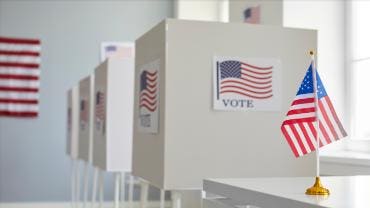Watch Your Wallet: How The Upcoming Election Could Impact Your Taxes

- Share to Facebook
- Share to Twitter
- Share to Linkedin
In an election year, my retired and soon-to-be retired clients are usually asking what a Republican or Democratic win will mean for the stock market. This time around, it’s not the direction of the stock market that’s on their minds, but the future of federal income taxes. The Tax Cuts and Jobs Act (TCJA) is scheduled to expire at the end of 2025, and the outcome of the November election will dictate changes to the U.S. tax code that could significantly increase annual tax obligations and total lifetime tax liability for some taxpayers. The TCJA provisions that are slated for expiration include lower federal income tax brackets, a higher standard deduction and a doubled estate and gift tax exemption, among others.
Where do the candidates stand on the matter? Republicans say they want to maintain the status quo and extend the TCJA tax breaks. They also favor lowering taxes for corporations and small business. In contrast, Democrats have expressed support for allowing the TCJA to expire for high-income taxpayers and rolling back permanent tax breaks for corporations.
What happens to taxes depends on which party is in the White House and which one controls Congress. If Trump is elected and Republicans have a Congressional majority, then I think we can count on taxes being status quo during the next few years. If Harris wins the White House and the Democrats have a majority on Capitol Hill, then I believe taxes will increase. If we get a divided Congress, where control of the two branches of government is split, then I expect we’ll see a good bit of compromise.
A divided Congress usually results in gridlock on Capitol Hill, which is generally positive for the stock market. One-party control of the White House and Congress usually sets the stage for change, provoking uncertainty about the future and leading to greater market volatility on Wall Street.
Regardless of who becomes president, higher taxes are likely in the long run
No matter who wins the race in 2024, I think we’ll eventually see higher taxes. After this election cycle, there’s no way to address the problems with Social Security and reduce the federal deficit without increasing taxes or pushing out the retirement age. The latter will be a very unpopular move and will be avoided at all costs, which leaves higher taxes as the only feasible option.
Apple iPhone 16 Pro: New Leak Reveals Powerful Design Upgrade Incoming, Report Says
Today’s NYT Mini Crossword Clues And Answers For Friday, July 26
Everything We Know About Today’s Olympics Opening Ceremony—As Lady Gaga-Céline Dion Duet Rumors Fly
Consider a Roth conversion right now
Given this prediction, I’m advising mature clients with retirement savings to consider a Roth conversion this year. By accelerating their tax payment on future qualified plan distributions, I believe they’ll be sharing far less of their hard-earned savings with Uncle Sam. A lot can happen to the U.S. tax code during the 25- or 30-year lifespan of the average retiree. From where I sit, I see taxes going up, not down over the long-term, so I prefer considering a client’s lifetime tax obligation rather than their annual tax liability.
function loadConnatixScript(document) {
if (!window.cnxel) {
window.cnxel = {};
window.cnxel.cmd = [];
var iframe = document.createElement(‘iframe’);
iframe.style.display = ‘none’;
iframe.onload = function() {
var iframeDoc = iframe.contentWindow.document;
var script = iframeDoc.createElement(‘script’);
script.src = ‘//cd.elements.video/player.js’ + ‘?cid=’ + ’62cec241-7d09-4462-afc2-f72f8d8ef40a’;
script.setAttribute(‘defer’, ‘1’);
script.setAttribute(‘type’, ‘text/javascript’);
iframeDoc.body.appendChild(script);
};
document.head.appendChild(iframe);
const preloadResourcesEndpoint = ‘https://cds.elements.video/a/preload-resources-ovp.json’;
fetch(preloadResourcesEndpoint, { priority: ‘low’ })
.then(response => {
if (!response.ok) {
throw new Error(‘Network response was not ok’, preloadResourcesEndpoint);
}
return response.json();
})
.then(data => {
const cssUrl = data.css;
const cssUrlLink = document.createElement(‘link’);
cssUrlLink.rel = ‘stylesheet’;
cssUrlLink.href = cssUrl;
cssUrlLink.as = ‘style’;
cssUrlLink.media = ‘print’;
cssUrlLink.onload = function() {
this.media = ‘all’;
};
document.head.appendChild(cssUrlLink);
const hls = data.hls;
const hlsScript = document.createElement(‘script’);
hlsScript.src = hls;
hlsScript.setAttribute(‘defer’, ‘1’);
hlsScript.setAttribute(‘type’, ‘text/javascript’);
document.head.appendChild(hlsScript);
}).catch(error => {
console.error(‘There was a problem with the fetch operation:’, error);
});
}
}
loadConnatixScript(document);
A competitive election offers freedom of choice
We have two candidates running for president who are incumbents with a track record, so we can make some educated guesses about what they’ll do in the White House. I view Trump as the pro-business, lower tax candidate, so I suspect he’ll be better for the economy assuming no external event like a terrorist attack or bank meltdown takes place. Note I said better for the economy, not the stock market. In my opinion, stock market performance is likely to depend on what the Fed does with interest rates regardless of who wins the presidency.
Now, this doesn’t mean I’m pro-Trump or pro-Harris. The economy and taxes are just two of many factors to consider when choosing a candidate. We each enter the voting booth with different priorities and values, which is why a competitive election is such a beautiful thing.



